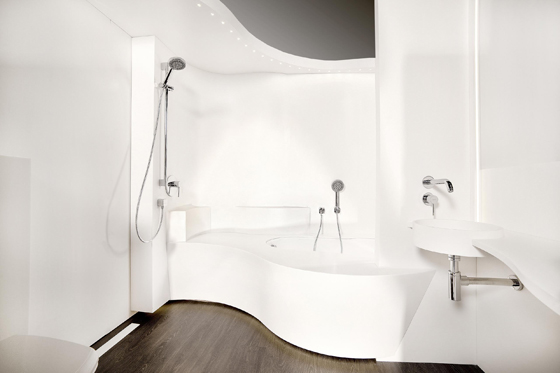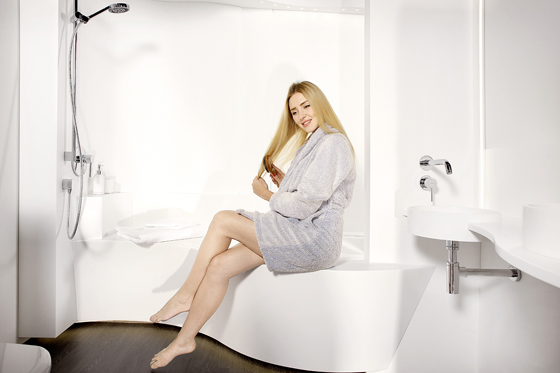STARON® Hotel Bathroom without Barriers at BAU 2015
Text by Anna-Maria Wiede
Germany
10.02.15
People with physical disabilities are dependent on buildings being designed in such a way that they provide disabled access. This principle has for the most part been applied in public facilities, even though there is still ground to make up in this respect. In hotels, on the other hand, the picture looks very different, and architect Ursula Fuss from Frankfurt, Germany, is therefore all the more pleased that Lotte Chemical Deutschland recently entrusted her with the challenge of designing a hotel bathroom with disabled access.
‘What use is the biggest and most attractive hotel suite to me’, states architect Ursula Fuss, ‘if I'm unable to use the bathroom because I can't get into it with my wheelchair, or the shower is constructed in such a way that I can't access it’

‘What use is the biggest and most attractive hotel suite to me’, states architect Ursula Fuss, ‘if I'm unable to use the bathroom because I can't get into it with my wheelchair, or the shower is constructed in such a way that I can't access it’
×The freelance architect and lecturer at Darmstadt University is herself a wheelchair user and is known as an expert in barrier-free design. She comments: ‘I estimate that at most something like three per cent of hotels in Europe are designed to provide disabled access,’ adding: ‘and what use is the biggest and most attractive hotel suite to me if I'm unable to use the bathroom because I can't get into it with my wheelchair, or the shower is constructed in such a way that I can't access it?’
Her design of a hotel bathroom without barriers had its premiere at BAU 2015 in Munich. The architect paid particular attention to ensuring that the basic dimensions of a standard hotel room were retained, stating: ‘Otherwise the necessary conversion work will not be financially viable for hotel operators, and anyway it's not the size of a room which decides whether it is accessible not, but the way in which the available space can be used effectively and individually. The important thing is to design the functional areas and the space available for movement in a sensible way, which requires the courage to throw conventional ideas overboard.’ For example, her design does without any shower partition, which enables greater freedom of movement and provides space for wheelchair users to get in and out of the chair to use the bathroom's facilities.
‘As a mineral compound, STARON® feels really good to the touch. Because the material can be moulded flexibly, handholds in the bathroom can be built into the prefabricated wall sections,’ states architect Ursula Fuss

‘As a mineral compound, STARON® feels really good to the touch. Because the material can be moulded flexibly, handholds in the bathroom can be built into the prefabricated wall sections,’ states architect Ursula Fuss
×The mineral compound STARON® Solid Surfaces is especially suitable for the creation of individual interior design, because it can be moulded as required when heated to around 180°C. ‘With this material the architect enjoys design flexibility both in 2-D and 3-D form,’ states Jürgen Lammers, Head of Business Development at Lotte Chemical, adding: ‘Together with our partners we are in a position to supply all required elements in prefabricated form. This pays off all the more if a hotel should decide to provide all the bathrooms in the building with disabled access on the basis of the same design.’ STARON® is supplied as panels in the standard dimensions of 3680 x 760 mm, but it can also be cut to any required size and moulded under vacuum conditions to almost any shape that is desired. It consists of aluminium hydroxide and an acrylic resin as the binding matrix, and comes in more than 80 different colours. In addition, the surface is easy to clean, which in the hotel sector in particular offers huge cost benefits.
‘As a mineral compound, STARON® feels really good to the touch, and with its many interesting colour compositions and patterns it offers great atmospheric diversity. As an architect it gives me versatility in the forms I use. Another excellent advantage is that because the material can be moulded flexibly, handholds in the bathroom can be built into the prefabricated wall sections, while shelving can be integrated entirely homogeneously,’ states Ursula Fuss.
STARON® Solid Surfaces is especially suitable for the creation of individual interior design, because it can be moulded as required when heated to around 180°C

STARON® Solid Surfaces is especially suitable for the creation of individual interior design, because it can be moulded as required when heated to around 180°C
×The bathroom fittings together with the wall-mounting elements and floor drainage systems are supplied by TECE, a company which is based in Emsdetten, near Münster in German region of North Rhine Westphalia, and markets innovative domestic engineering solutions. The free-flowing formal idiom created by the architect is realised to perfection in its brands TECEprofil, covering installation and wall-mounted systems for bathroom walls produced in dry construction, and TECElux, a multi-functional WC unit. The TECElux WC unit combines a number of intelligent functions, such as odour extraction, one-touch activation and dual flush, which will significantly enhance this new-generation hotel bathroom. The classical wall-mounted systems have been adapted to requirements and the relevant connections created at the factory stage.
Architect Ursula Fuss has, in cooperation with Lotte Chemical as the manufacturer of STARON® and TECE as the sanitation suppliers, succeeded in creating a pioneering design and states: ‘I'm grateful to Lotte Chemical for opening up new possibilities for creating accessibility and hope that many hotels will be impressed by our concept.’
STARON® Solid Surfaces is manufactured in South Korea and is sold within more than 30 European countries in the form of styrene-free, acrylic-based solid panels and moulded sections. At BAU 2015 in Munich, SCEG for the first time presented, in cooperation with its partner companies, the full range of applications for the design of hotels, restaurants, office facilities and the construction of walls and facades.
Cooperation partners:
TECE, featuring the TECE section installation / wall-mounted system for bathroom walls in dry-wall construction, with the multi-functional TECElux WC unit.
Architect Ursula Fuss
Free-lance architect and lecturer at Darmstadt University, expert in barrier-free design in hotels and public buildings.


